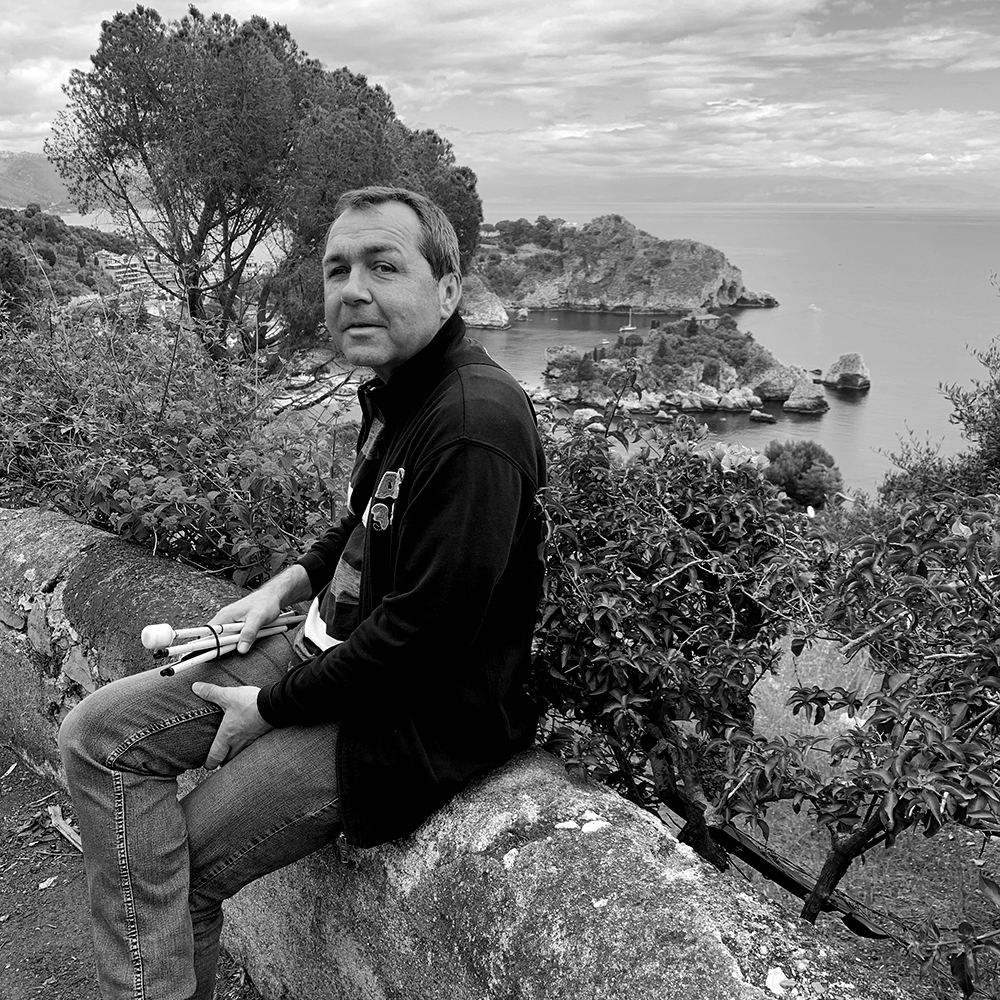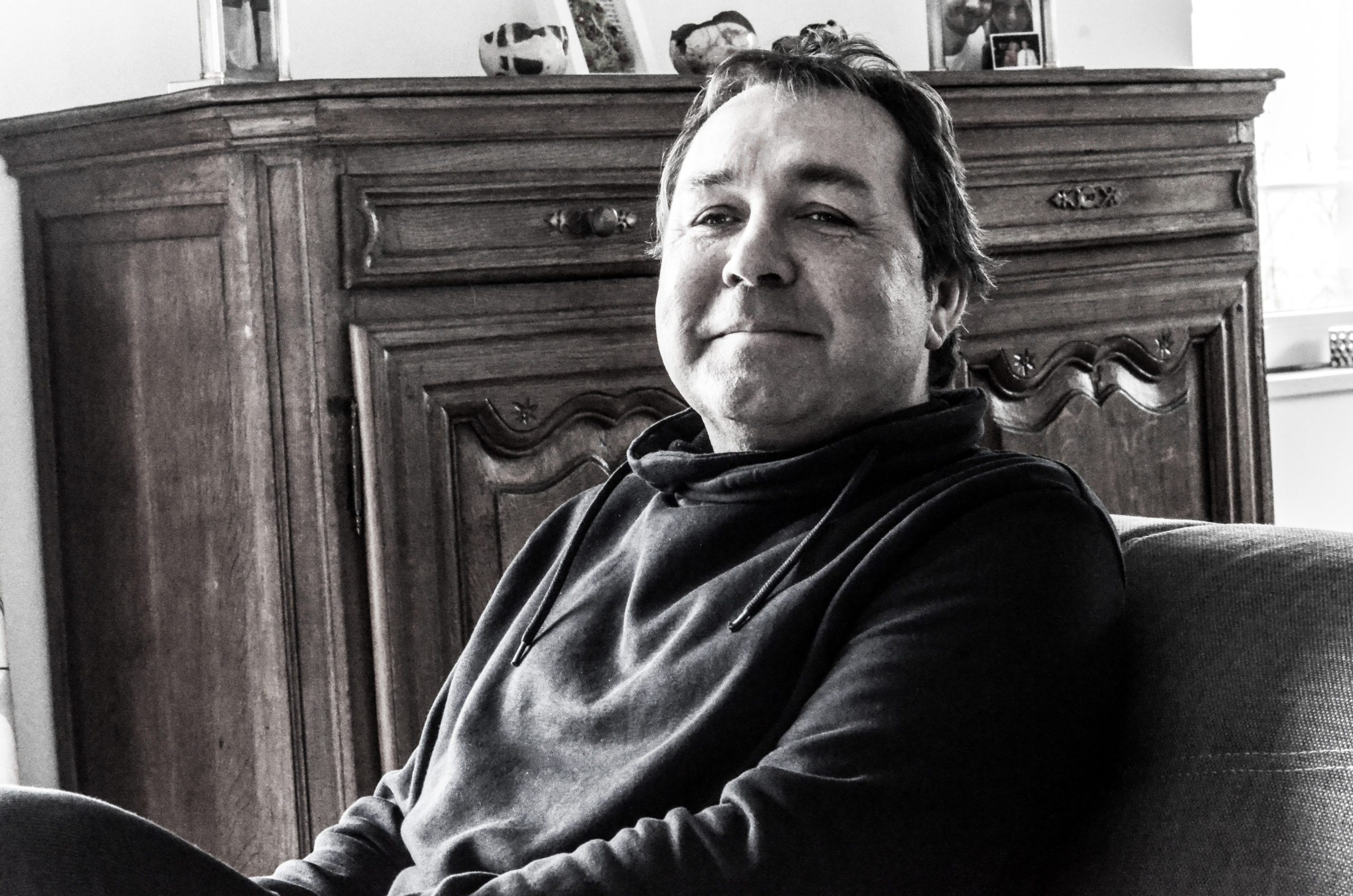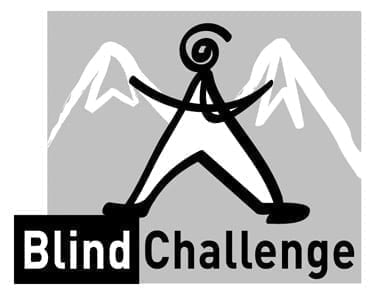Philippe Dumonceau
I am Philippe-Renaud, born and raised in Montegnée, close to Liege in Belgium. I was born with a poor vision and when I became a teenager, it deteriorated further, so much so that one day I realised that I could no longer read from the black board at school. It was difficult to motivate myself to follow the classes, and keep studying since the vision was deteriorating.
At first my family did not realise how poor my vision was, because they were not fully aware of my condition, and the teachers rightly assumed that wearing glasses was probably the solution.
Later, at the age of 18 my vision became progressively worse, and I could hardly get a glimpse of anything, even in close up. The disease made me completely blind – I woke up one day and barely could see anything around me. At this point I was taken to the hospital for the first time for a genetic check up and went through several thorough tests.
The doctors informed me that unfortunately the illness was incurable, as it was a genetic disorder called – Leber, which is an inherited form of vision loss.
Thereafter it took only two months and I went completely blind. It was the shocking news for both my family and myself, because none of us were prepared for my sudden lost of sight. Because of this disability, I was not able to finish the high school and in the last year I dropped out.

My life after I lost my sight as a constant inner fight with myself
Two years later blindness dragged me into a depressed state of mind, I just could not accept the situation that I was in. This new way of life and the situation I was in was beyond my imagination.
I lost the meaning of life, my zeal and motivation, as well as some of my friends. However as I was still rejecting my blindness, I tried hard to do everything I was used to. At first I did not tell people about my lost of sight and attempted to deal with the blindness on my own.
“I did not seek any help, because I could not admit that I was blind. I rejected the diagnosis of my disability in every sense of word. I was in denial.”
Most of the time I just stayed at home lying in bed and being miserable. After a while however my father’s patience ran out with me, and he encouraged me to get some help from “La Lumière”. He told me that I had to learn how to live life without vision.
Despite this shocking decision my father had taken I still refused to admit to myself that my life changed and I needed to adapt to my new way of life. I remembered once walking into the town without any support, basically as I used to do and I got confused by my surroundings. This led me to fall into a deep pit. Luckily I did not get seriously injured but I hit the rock bottom of the pit. I realised just then that being blind and in a wheelchair would become far worse for me than it was already.
Taming the world around myself
After this lucky escape I realised that I had to seek for some professional help, as I could no longer fool myself.
At the time I was living near Liege and I went to the association called “La Lumière” (EN “The Light”). These folks help visually impaired people to adjust and re-integrate into society, find autonomy and social inclusion while living blind.
The association taught me how to read Braille, to write, to cook safely – you realise – the simple difficulty of doing usual chores correctly for a blind person. I had to develop the sensitivity of my fingers through occupational therapy.
There I learnt how to become autonomous again – how to build the world around myself that serves the majority but integrate myself in it, how to use a white cane to be able to move alone, and dealing with other daily challenges.
During the time I spent at the centre learning the basics, I also met a wonderful woman, who was like a second mother to me and motivated me along my journey of adaptation. She also pushed me into sports, although physical activities were never something I have ever tried or did before. Simply, I never had an interest in it.
However, she pushed me so well that in 1993 I went mountaineering for the first time, shortly followed by Alpine skiing and hiking.

Leaving my home
As I learnt how to live my life again and how to be independent from any one’s support, I became accustomed to my situation. It was then that my father asked me to leave home.
At that time it was very hurtful to hear, but I learnt later that this was a wise stance to take because I was a grown man and I should live my own life on my own as Pema Chödrön (a Buddhist nun) describes it – “to be fully alive, fully human, and completely awake is to be continually thrown out of the nest.” Now I am thankful to him because I have got full independence and autonomy.
Keep on climbing through the mountain summits
“La Lumière” association was a real eye opener and a life changer. At this organization I met some similar visually impaired like-minded people who became traveling companions and great friends.
In 1997, I decided to take a hiking trip and walked about 1,600 km on foot by the way of Santiago de Compostela (from Le Puy en Velay in France to Santiago in Spain). It took me 2 months to walk that distance. Although those trips are mainly organized by a catholic community, it was a spiritual walk and retreat to me.
I managed to complete the trip and, on the way, met many people from all over the world who I still keep in contact with today. However, I was very disappointed with the religious organizations, which banned me from sleeping inside as I had a guide dog with me. Most of the time I had to sleep outside, and that made me think a lot about so called goodwill charities. Regardless of this experience, I had a lot of dreams that I would meet the woman of my dreams, and I did. Three years later after the trip in 2000, I met Fabienne who became my spouse in 2013.
After this walking tour, I have got very interested in hiking and mountaineering. With some of my new friends I went climbing in the Alps, reaching up to 3,000 meters, of course with some physical preparations as well. In 2010 I climbed the summit of – MERA PEAK – 6476 m high in the Himalayas in Nepal.
From the first moment of climbing my first mountain I have always been seeking to climb higher and higher.
“Climbing helps to me meet new people and prove to myself that I can exceed my expectations and do much more than I thought I could.”
The aim of my life became climbing. I felt much better, accepted the adjustments to my new life and finally found some joy in my life and motivation.
Since then every year I has been participating in climbing projects to keep myself motivated. So far I have travelled to India, Morocco, Nepal and have met plenty of friends (with and without disabilities) who join me in climbing together.
In 2012 I came up with another idea, of climbing for those who want to experience mountain climbing but have not had an opportunity yet to do so. In Liege, Belgium there is a little street called the Montagne de Bueren with a 374-step staircase. I calculated that if you like to reach Mount Everest you would need to climb up and down over 130 times. So I organized the event which I called Le Everest de Bueren for those who liked a challenge to reach “Mount Everest” in Liege. It was open to everyone and people tried to do it in groups or individually. The only challenge was to complete the distance in 24 hours to reach “the top”.
Discovering BLIND CHALLENGE
Back in early 2000 I proved to myself that I could overcome all challenges and there has been nothing left to prove. Until 2005 I did everything I have never done before in my life – I went skiing, hiking, visiting a number of amazing places, learnt how to use electronics so nothing was impossible anymore.
As my life became richer with all this experience, I realized that I need to do something for others who undergo a similar journey, just like I went though.
In 2005 I created the non-profit, non-political independent association called “Blind Challenge”, which has now existed for 15 years and has over 2,000 members across the world. We work alongside people with visual impairments to offer sports, discovery and integration activities open to all.
I became an engine of this association, running various challenges such as trips, sports events, suitable alpine skiing, climbing, hiking in medium to high mountains, snowshoeing, windsurfing, parachute, caving, paragliding, water skiing, running where we welcome and are open to all: blind, partially sighted and anyone else who are interested in taking part. Those activities enabled blind and partially sighted people in particular, to enjoy the challenges of a variety of pursuits without being overcharged for those activities, which is the key philosophy of the organisation.
Nothing is despondent or sad in this association and nothing reminds of our disabilities. We go hiking, cycling, skiing, preparing and enjoying dinners together in the dark, where we invite people with vision to experience how is to be bind and eat in darkness. Besides that, our association also organises annual events to raise awareness about visual disability, and through a number of conferences, events and trips we involve people in experiencing what is like to be blind. These events remain a great challenge and a unique adventure for each participant, whether disabled or not.
One of the key highlights are annual ski trips in Europe, where blind and partially sighted people, with the help of a guide, enjoy skiing trips.
What inspires and motivates you?
In La Lumière I met a therapist who encouraged me to do some sports. Since then I have never stopped exercising in the broadest sense of the word – skiing, climbing, travelling, hiking. This is the best thing I have ever discovered that has given me so much positive energy, zeal and motivation. Along those activities I also met a bunch of great people who truly became my best friends.
What is the motto of your life?
“Going forward and proving to myself that almost nothing is impossible, only the sky is the limit.”
Since 2005 when I established my own association, I always say that when you have a difficulty in life, jump higher than you did before and do not give up.

What is the biggest challenge have you done up to now?
Climbing the Mera Peak in Nepal, which has a 6,476 meters summit. As well as water skiing, as I am very afraid of water.
What new challenges would you like to undertake in the future, if any?
I would like to build a school and help blind children in Morocco.
What are the most important things to you in your life now? Why?
Just simple things – stay happy with my wife, share good moments with friends and keep travelling.
What one advice would you give to others (not necessary living in similar conditions)?
Never give up and do not let other people tell you what is impossible.

If you like to make donation to help Blind Challenge:
Name of organisation: Blind Challenge
Bank name: Belfius
Bank account: BE72 7795 9119 3816
BIC code: GKCCBEBB
DETAILS
Name: Philippe-Renaud DUMONCEAU
Industry: Non-governmental / Health
Country: Belgium
